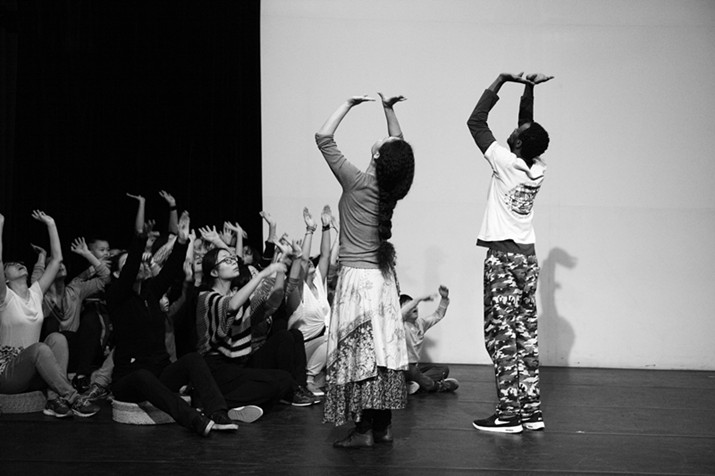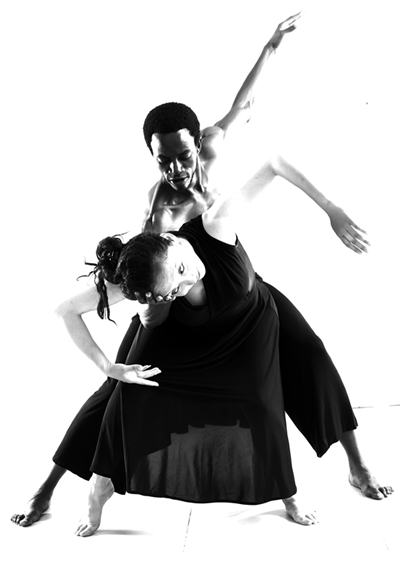|
||||||||||
| Home Nation World Business Opinion Lifestyle ChinAfrica Multimedia Columnists Documents Special Reports |
|
||||||||||
| Home Nation World Business Opinion Lifestyle ChinAfrica Multimedia Columnists Documents Special Reports |
| Lifestyle |
| Rhythm of Love |
| An international couple's passion for dance connects China and Africa |
| By Cui Xiaoqin | VOL. 8 November 2016 ·2016-10-27 |

The couple at a recent workshop in Beijing (COURTESY PHOTO)
In a traditional Chinese courtyard house in Beijing, a group of Chinese kids, standing in a circle while holding hands, are practicing some simple moves to the sounds of African drums, under the astute guidance of Cameroon choreographer Simon Romuald Abbé. His wife, young Chinese dancer Jiang Keyu, is telling African stories connected to the dance so as to inspire the children's creativity.
The workshop is an effort of ABBE Dance Co., founded by the couple, to promote African dance in China. Abbé led his team Black Star to win a major urban dance championship in Cameroon four years in a row. Jiang, freshly graduated from the Beijing Dance Academy in 2005, went to Cameroon to teach modern dance where she met Abbé, who later became her husband.
"Our purpose in founding the dance company is to promote African dances and culture, so as to contribute to enhancing mutual understanding, as African culture begins to be widely accepted and welcomed across China," Jiang told ChinAfrica.
African love story
In 2005, Jiang had an opportunity to help Cameroon build its National Dance Troupe by providing training for its dancers as part of a project of China's Ministry of Culture.
"Aside from its football team, I knew nothing about Cameroon before I went there," said Jiang. Facing many unknowns, Jiang and her Chinese dancer colleague started giving formal lessons after a three-month-long recruitment process, all while dealing with numerous difficulties such as language barrier and diseases. They have been spearheading their efforts to help Cameroon establish its own national dance troupe, from developing teaching contents and supporting the troupe's promotion to planning its future development.
Only one year after its creation, the Cameroon National Dance Troupe had already performed with great success in many countries such as France, Algeria, Japan and Gabon. Encouraged by these accomplishments, Jiang's initial one-year contract in Cameroon was extended to four years.
"Abbé and his team have been of great help to the development of the national troupe due to their solid foundation in dancing," she told ChinAfrica.
Aside from her role in helping build the country's national dance troupe, Jiang reckoned that Cameroon is a place of great significance to her, for it is there that she fell in love with her husband.

Abbe and his wife Jiang perform together (COURTESY PHOTO)
Joy of dance
In 2008, Abbé founded his own business called ABBE Dance Co. in Cameroon. In 2012, he set up the company's Beijing branch with Jiang, with the goal of introducing African dance to China.
The company is trying to develop a unique mixture of dance using elements from Chinese martial art taiji, African dance, hip-hop and contemporary dance. In Jiang's opinion, taiji and other Chinese traditional practices can be used as innovative forms of dance training.
"All forms of dance emphasize connection with the ground. All dance moves are based on the idea that power comes from the ground. I have found many similarities in learning Chinese martial arts such as taiji," she said. "The more the power comes from the ground, the more stable dance moves are."
Although Chinese and African dance cultures may seem very different, in some respects they can be very similar, according to the Cameroon choreographer. He pointed out that African dance routines can be found among some of China's ethnic minorities.
Jiang believes ABBE Dance can play a bigger role in promoting a better understanding of these similarities. "We would like to help Chinese people [through our teaching] develop their sense of rhythm, improve their physical fitness, and inspire their creativity. Therefore, sometimes I don't tell them how to perform; instead, I encourage them to dance spontaneously to stimulate their potential."
As Abbé tries to build his connections with China, Jiang is deepening hers with Africa. In a recent workshop in Beijing the couple taught Chinese children African drum and dance. "After five days of learning, Chinese students become very interested in exotic African dancing," said Jiang. After she introduced Chinese students to improvisational dance, her husband taught them how to keep balance while carrying objects on the head, much like their peers do in Cameroon.
Many of ABBE Dance's adult students said African dance helps them forget their troubles and relax both physically and mentally. This is the goal Jiang has always been pursuing: how can I make ordinary people with no prior experience of dancing feel the joy of dance, as well as the rhythm of African drums?
Moving on
The couple is now operating their own art-focused public WeChat account, on which they have launched a series of courses on African drumming and modern dance, in the hope of bringing more ordinary people to an understanding of the art.
Jiang said that an increasing number of Chinese are interested in African culture, but non-governmental exchange is still very limited. "In my opinion, exchange [between China and Africa] is very effective on a governmental level," said the dancer, whose work in Cameroon is a typical example of successful government-sponsored cooperation. But she also pointed out that cultural exchange between private institutions is facing many difficulties.
ABBE Dance, a private art group, has actively developed and secured many performance opportunities, but it still hopes to receive more support from government and other agencies, so as to further promote African dance in China.
Jiang is pleased to see her former Cameroon students making their own contributions to Sino-African cultural exchanges. Some of them even came to China to study dance as well as TV production, and often took part in activities aimed at introducing African hair braiding and cuisine in the country.
"These continued activities play a crucial role in promoting cultural exchange in the long run," said Jiang. She also expressed hope that a better platform for Sino-African non-governmental cultural exchange will arise from ABBE Dance's seemingly inconsequential but unrelenting efforts.
| About Us | Contact Us | Advertise with Us | Subscribe |
| Copyright Beijing Review All rights reserved 京ICP备08005356号-5 京公网安备110102005860号 |